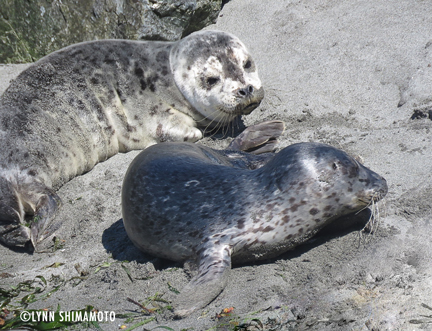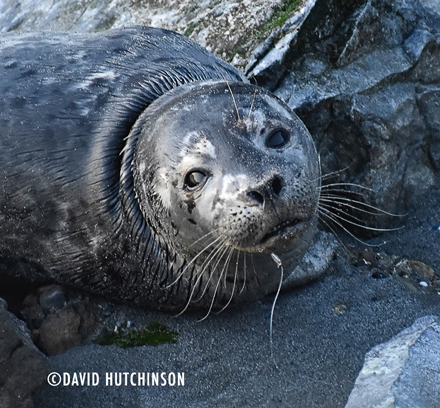Tango
Seal pups relocated to remote island for their safety
Sep/02/20 08:25 AM

Over the past days, the pups, nicknamed Foxtrot (L) and Tango (R), had been coming and going from the highly visible and accessible public beach next to a popular pier, trying to get much-needed rest. The very busy Alki Trail runs next to that beach along the seawall, with stairs leading directly to the sandy nook the pups were using. Volunteers set up a tape perimeter during daylight and early evening hours when the pups were onshore, but still people were observed crossing the tape to access the beach or look at the seals, despite clearly marked signage.
When Seal Sitters became aware the pups were returning late each night for a few more hours rest, the stairs were blocked off with signboards and tape to protect them. It was obvious, however, that people were breaching the perimeter overnight and going down onto the beach. When Responders checked in the early mornings to see if the animals were on shore, they found commingled seal tracks, human footprints, dog prints, litter and human excrement despite double rows of tape, cones and barriers that had been put across the steps. It is against federal law, the Marine Mammal Protection Act, to harass (disturb, touch, feed, move or otherwise harm) seal pups.
Seal Sitters’s hotline began to receive troubling reports of people touching and harassing the pups, ignoring warnings from passersby and barriers the few times SSMMSN First Responders were not present. Due to COVID restrictions and facemask requirements, Responders are under strict guidelines to have limited contact with the public at a minimum 6 foot distance whenever possible.

The pups’ proximity to fishing piers and the boat dock made them vulnerable to further entanglement. Seal pups often seek out places with easy fishing. Boat docks and piers are a Mecca for tiny fish - and, unfortunately, also discarded bait and derelict or live line and lures. Several other pups in South and Central Puget Sound have been reported with fishing lures dangling from their mouths, but have yet to be found. Seal pups around fishing piers seldom results in a good ending.
Based on the combined threats of fishing gear entanglement and increased harassment from people, the decision was made to relocate them for their safety.
Seal Sitters First Responders with assistance of SR3 captured the pups Sunday afternoon, just as WDFW Marine Mammal Investigations and World Vets arrived by boat and landed at the point. The pups were quickly transferred, given a medical exam on the boat and taken to a secluded South Sound island. Both pups were tagged with unique ID numbers and marked with green bio paint for easier re-sights in the wild. Seal Sitters is so grateful that the pups could be relocated together.
The rescue and relocation on Sunday was yet another example of the tremendous teamwork of Marine Mammal Stranding Networks SSMMSN and WDFW MMI and our fantastic support groups, SR3 and World Vets. Heartfelt thanks to everyone who gave these two pups a better chance for survival.
The video clip below shows Foxtrot and Tango frolicking in their new waters:
View a more extended video of the rescue and the release into the wild HERE.
SEAL PUPPING SEASON IS IN FULL SWING
Harbor seal pupping season is currently underway in our area and seal pups need to be able to rest onshore. Please remember to stay away from pups, leash your pets, and call Seal Sitters at 206-905-7325 (SEAL) if you see a marine mammal on the beach in West Seattle. For information on who to call in other areas of Washington, click here.







